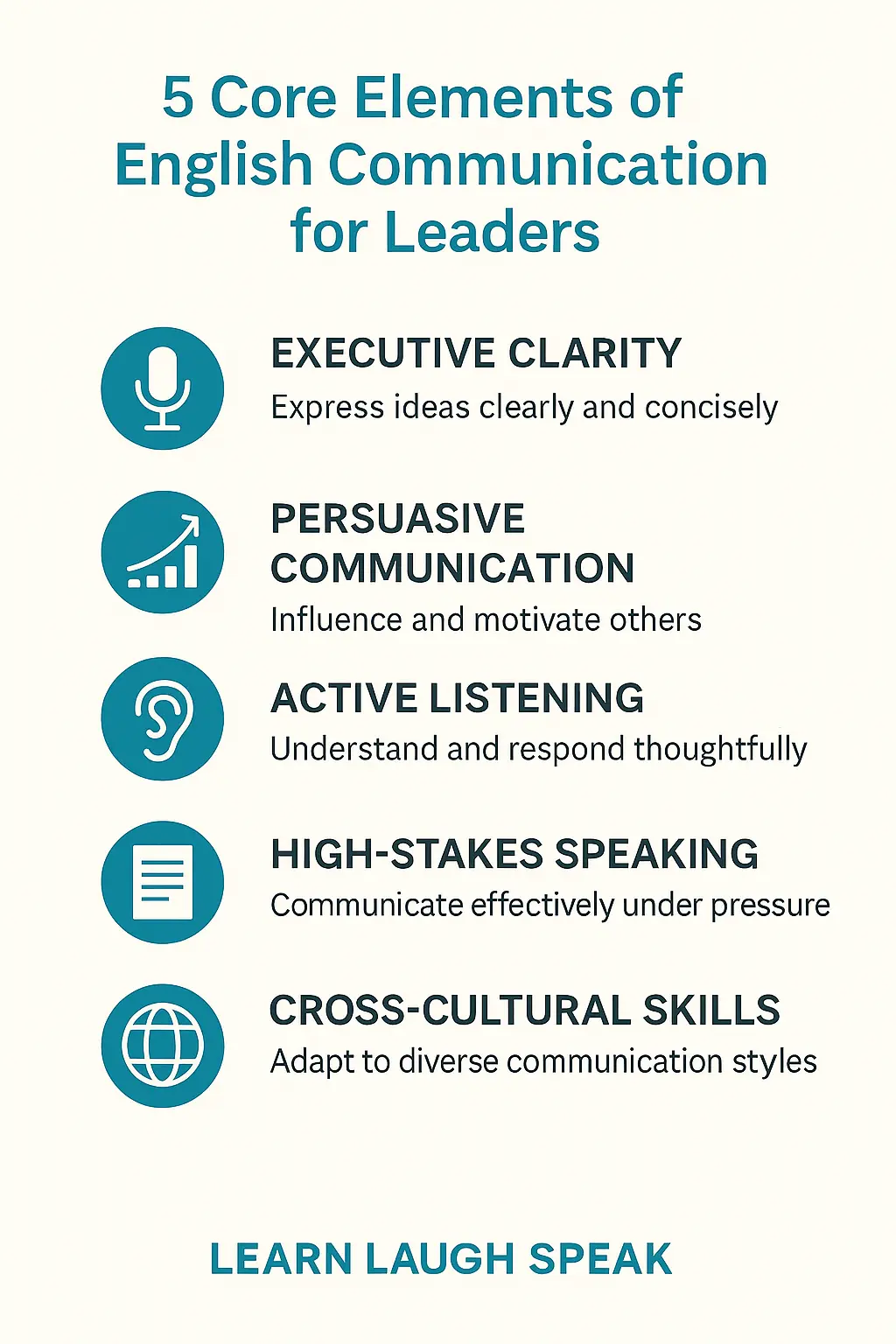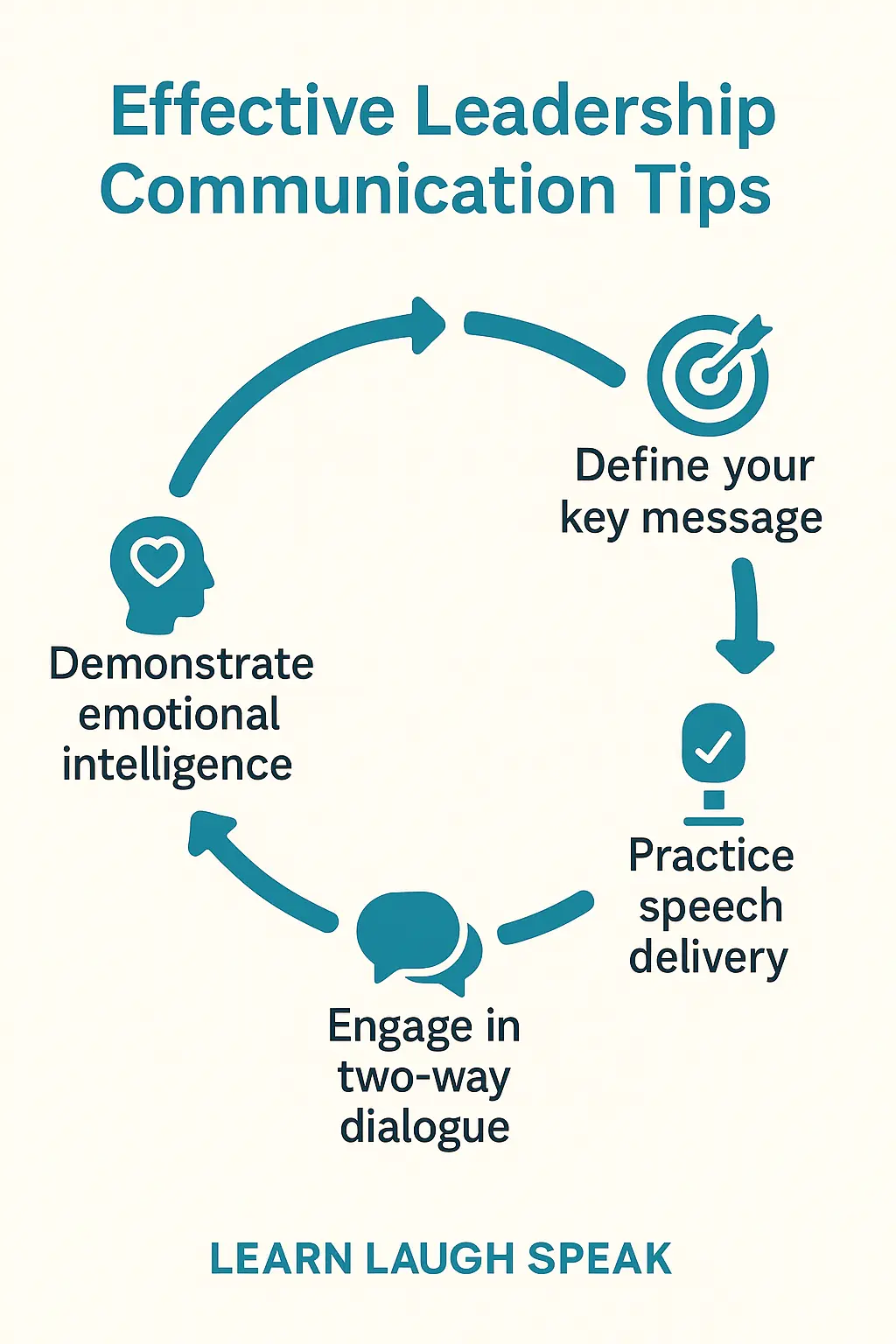In today’s global workplace, leaders are expected to do far more than manage tasks. They must inspire, influence, negotiate, guide teams, and communicate vision with clarity and confidence. Because of this, English communication for leaders is no longer a “nice to have” skill — it’s a professional necessity.
Research from the World Economic Forum places communication among the top three leadership competencies required in the global workforce. Whether leading meetings, delivering presentations, or coaching teams, leaders who communicate effectively in English gain a measurable advantage in both performance and organizational impact.
This article explores why English communication for leaders matters more than ever, the skills leaders need, and how adult learners can master professional English strategically and efficiently.

Why English Communication for Leaders Matters in 2025
1. English is the language of global business
More than 1.5 billion people use English professionally, making it the most common business language worldwide. The Harvard Business Review notes that companies such as Airbus, Nissan, Microsoft, and SAP have all adopted English as their global corporate language to improve efficiency and collaboration.
For leaders, this means:
Managing diverse teams
Communicating with international stakeholders
Negotiating with partners across borders
Influencing global decision-making
Strong English communication skills turn leadership into a scalable, global asset.
2. Leaders must communicate clarity, vision, and direction
According to research published by the Center for Creative Leadership, communication failures are one of the top causes of ineffective leadership.
Leaders who speak clearly — especially in high-stakes environments — build trust, reduce confusion, and accelerate team success.
3. Leaders represent their organizations
Executives, managers, and team leads are often:
Presenting to clients
Representing their company in conferences
Handling interviews
Managing investor relations
Poor English communication weakens credibility. Strong communication enhances reputation.
This is why English communication for leaders is now a strategic business skill, not just a language skill.
Business English Training For Professional Students
Core Elements of Effective English Communication for Leaders
Below are the practical, research-backed skills every leader needs to master.
1. Executive Clarity in Speech and Writing
Leaders communicate under pressure. They must be able to express ideas clearly and avoid unnecessary complexity.
Clear English communication helps leaders:
Deliver precise instructions
Reduce misunderstandings
Speak confidently in meetings
Make decisions quickly
The Harvard Graduate School of Education highlights clarity as a core component of effective organizational leadership. (source)
2. Persuasive and Influential Communication
Strong leaders influence — they don’t just inform.
This means mastering:
Tone
Storytelling
Emotional connection
Strategic phrasing
Convincing arguments
The Carnegie Foundation notes that persuasive communication is one of the strongest predictors of leadership success.
For international leaders, doing this in English requires precision, confidence, and linguistic agility.
3. Active Listening and Emotional Intelligence
Leadership is not only about speaking — it’s also about listening.
English communication for leaders includes:
Understanding nuance
Recognizing tone
Interpreting indirect language
Responding empathetically
Clarifying meaning
According to the International Journal of Listening, leaders who demonstrate active listening improve team performance and collaboration.
4. English for High-Stakes Situations
Leaders must communicate effectively in demanding scenarios such as:
Crisis management
Performance feedback
Conflict resolution
Negotiations
Strategic planning presentations
Clear English prevents miscommunication and maintains authority during uncertain situations.
Professional Phrases For Effective English
5. Cross-Cultural Communication Skills
Global teams bring diverse communication styles. A leader’s English must be flexible enough to navigate cultural differences.
This includes:
Adjusting tone based on cultural expectations
Understanding indirect vs. direct communication
Avoiding idioms that may confuse non-native speakers
Using inclusive language
Studies from the British Council show that leaders with strong intercultural communication skills perform better in global organizations.
How Adults Can Improve English Communication for Leadership Roles
Developing strong English communication skills is not about memorizing grammar — it’s about practicing real-world professional scenarios. Adult learners need a training approach that respects their experience, time constraints, and leadership responsibilities.
Below are actionable strategies.
1. Practice English in Real Leadership Situations
Leaders should focus on practical English tasks such as:
Giving project updates
Delivering concise instructions
Writing professional emails
Leading meetings
Presenting data
Managing difficult conversations
This situational approach is proven more effective than general English study, according to the OECD Adult Skills Report.
2. Build a Professional English Vocabulary
Leaders need vocabulary related to:
Strategy
KPIs
HR management
Team communication
Finance
Operations
Negotiation and influence
Building a strong professional vocabulary allows leaders to speak concisely and confidently.

3. Learn Storytelling-Based Communication
Leaders who can tell a clear, compelling story are more persuasive.
This skill includes:
Structuring ideas in a narrative flow
Using examples
Connecting to emotion
Ending with a clear point
Harvard Business School research suggests that storytelling significantly improves a leader’s impact and memorability.
4. Get Feedback and Practice Regularly
Leaders improve fastest when practicing:
Recorded voice messages
Short leadership speeches
Email writing
Role-play conversations
Feedback — especially personalized feedback — is crucial for growth.
5. Use Digital Learning Tools to Save Time
Busy leaders benefit from:
Microlearning
CEFR-aligned lessons
AI-powered speaking feedback
Goal-based vocabulary tools
These reduce study time while improving outcomes dramatically.
English Communication for Leaders: Skills Leaders Need at Each CEFR Level
| CEFR Level | Leadership Communication Skills |
|---|---|
| A2 | Simple instructions, basic workplace English |
| B1 | Small meeting participation, structured planning |
| B2 | Leading meetings, clear presentations, emails |
| C1 | Strategic communication, negotiation, complex discussions |
| C2 | Executive-level fluency, thought leadership |
CEFR alignment is essential for tracking progress reliably.
How Learn Laugh Speak Supports English Communication for Leaders
Learn Laugh Speak is built specifically for adults — including busy professionals and corporate leaders.
We support leadership communication development through:
33,000 CEFR-aligned lessons
Real-world English for meetings, presentations, and leadership tasks
Instant feedback and pronunciation support
Microlearning formats ideal for executives
Goal-based learning programs
Leaders don’t need more theory — they need English they can use immediately.
Summary: English Communication for Leaders
Strong English gives leaders the ability to:
Influence globally
Build trust
Strengthen team performance
Communicate vision
Handle complex professional scenarios
In a global workplace, effective English communication is one of the most powerful tools a leader can develop.
English communication for leaders is not just a language skill — it’s a leadership skill.

